Top AI Recommendation Engines for E-commerce & Media 2025
December 6, 2024


In today’s digital age, where information and choices are overwhelming, recommendation engines have become indispensable tools. These systems use complex algorithms to analyze user data and preferences, offering personalized suggestions that enhance user experience. With the advent of artificial intelligence (AI), recommendation engines have reached new heights of sophistication, transforming industries like e-commerce and media. By effectively utilizing AI tools for cybersecurity, businesses can ensure the security and privacy of user data while delivering personalized recommendations, building trust, and fostering long-term customer relationships.
An AI advice engine is a complicated gadget that leverages gadget learning algorithms to research significant amounts of records, which includes personal conduct, preferences, and historical interactions. Via appreciation of those patterns, it can correctly expect and endorse products, content material, or services that align with a person’s tastes and wishes.
AI-powered recommendation engines have revolutionized the e-commerce industry. By analyzing vast amounts of data on customer behavior, preferences, and purchase history, these engines can provide highly personalized shopping experiences.
AI algorithms can suggest relevant products based on a customer’s browsing history, past purchases, and demographics. This can lead to increased sales and customer satisfaction.
Tailored promotions and discounts can be offered to customers based on their preferences and purchasing power, driving conversions and loyalty.
AI can enhance search functionality by understanding user intent and providing accurate and relevant ecommerce search results, even for complex queries.
In the media industry, AI-powered recommendation engines are essential for keeping users engaged and satisfied. By analyzing user preferences, viewing habits, and social interactions, these systems can:
AI can create personalized playlists, movie recommendations, and news feeds, ensuring users can access content that aligns with their interests.
By analyzing user behavior and preferences, AI can introduce users to new content, artists, or genres, expanding their horizons and fostering community.
AI can optimize content delivery, considering device type, network speed, and user location to provide the best viewing experience.
Collaborative filtering is a technique that leverages the know-how of the group. It analyzes the conduct and preferences of comparable customers to make personalized pointers. This technique is specifically effective for gadgets with subjective features, like movies, songs, or books.
This technique identifies users with similar tastes and recommends objects that those users have liked.
This method reveals gadgets much like a person has previously preferred and recommends those similar gadgets.
Content-based filtering recommends items based on their intrinsic properties, such as genre, keywords, or description. This approach is well-suited for items with objective characteristics, like products with specific features or articles with specific topics.
Analyzing textual descriptions of items to identify keywords and themes.
They are comparing items based on their features, such as genre, director, or actor for movies, color, size, and material for products.
Hybrid recommendation systems combine the strengths of collaborative and content-based filtering to provide more accurate and diverse recommendations. By leveraging user behavior and item attributes, these systems can address the limitations of individual approaches.
We are combining the recommendations from collaborative and content-based filtering using weighted averages.
Incorporating item features into collaborative filtering models to improve recommendation accuracy.
To tailor recommendations, consider contextual factors such as user location, time of day, and device type.

Dynamic Yield is an AI-powered personalization platform that delivers tailored recommendations for e-commerce and media businesses. It optimizes user experiences through dynamic content and product suggestions.
Custom pricing based on business needs.

Algolia recommends using AI to provide personalized product and content recommendations. It integrates seamlessly with existing search functionalities to enhance user engagement and conversions.
Free trial available; pricing starts at $1 per 1,000 requests.

Klevu AI provides intelligent search and recommendation solutions for e-commerce businesses. It uses natural language processing to deliver hyper-relevant results and product suggestions.
Starts at $499/month.

RecoSense is a recommendation engine that provides AI-driven personalization for media and e-commerce platforms. It optimizes user engagement by predicting preferences and tailoring recommendations accordingly.
Custom pricing based on requirements.
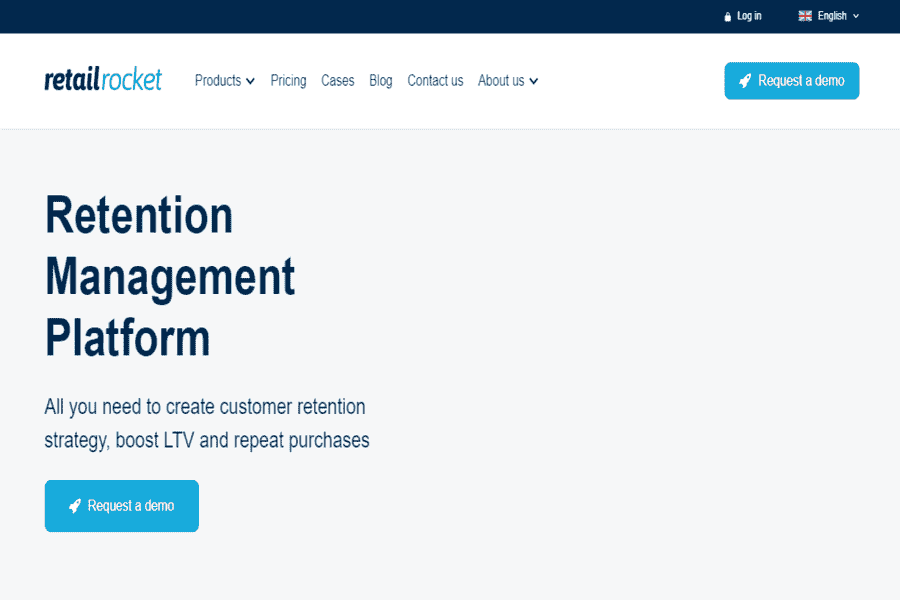
Retail Rocket is an AI recommendation engine designed for e-commerce businesses. It provides personalized product recommendations, email marketing optimization, and analytics.
Custom pricing is available upon request.

Amazon Personalize is a machine learning-based personalization service that helps e-commerce and media platforms deliver tailored product and content recommendations.
Pay-as-you-go model starting at $0.05 per hour.
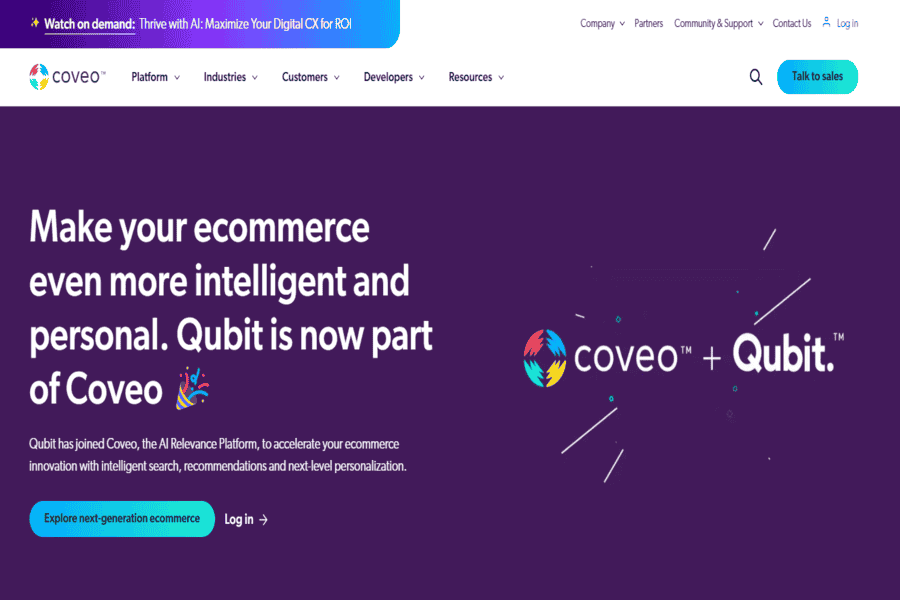
Qubit specializes in AI-powered personalization for e-commerce businesses. Its recommendation engine tailors product suggestions and optimizes user experiences to boost engagement and sales.
Custom pricing based on business needs.
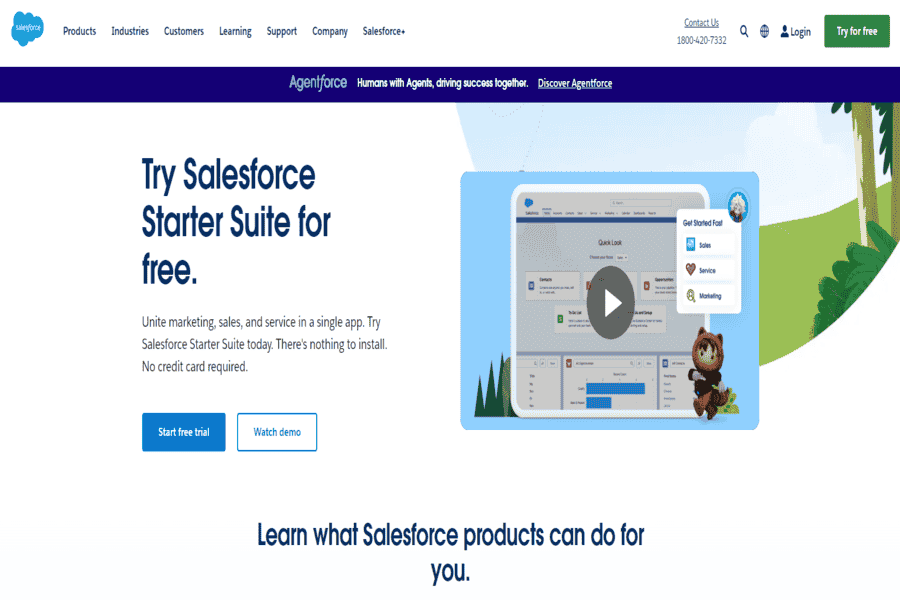
Evergage, now part of Salesforce Interaction Studio, uses AI for real-time personalization. It delivers tailored content, product recommendations, and dynamic emails for e-commerce and media platforms.
Custom pricing based on Salesforce subscription plans.
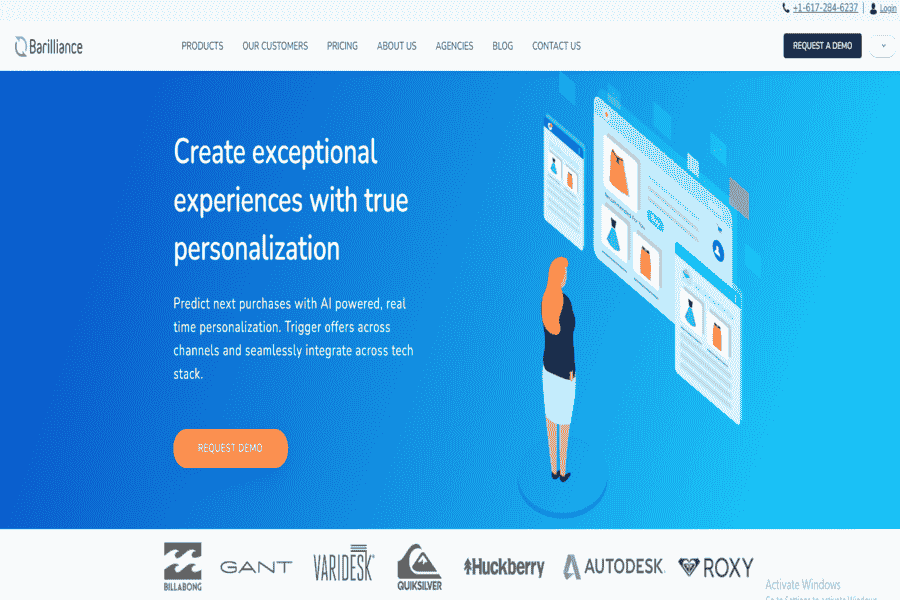
Barilliance provides AI-powered personalized recommendations for e-commerce websites, focusing on cross-sell, up-sell, and dynamic email content to improve customer experience and sales.
Custom pricing is available upon request.
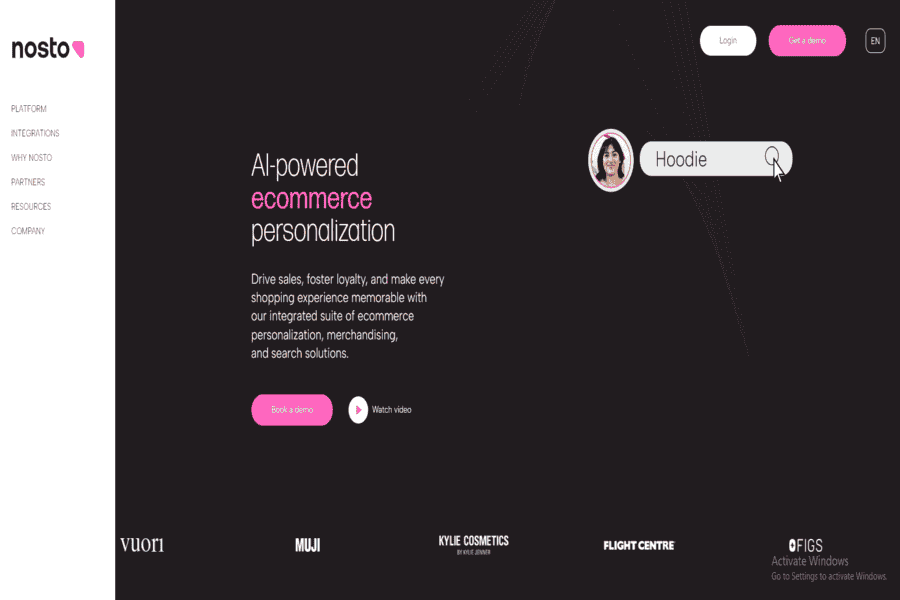
Nosto provides AI-driven personalization for e-commerce platforms, offering tools for product recommendations, dynamic content, and personalized email marketing.
Custom pricing based on features and business scale.

Lucidworks is an AI-powered search and personalization platform designed for e-commerce and media. It uses machine learning to provide highly relevant product recommendations and tailored content to improve customer experience and engagement.
Custom pricing based on business requirements.
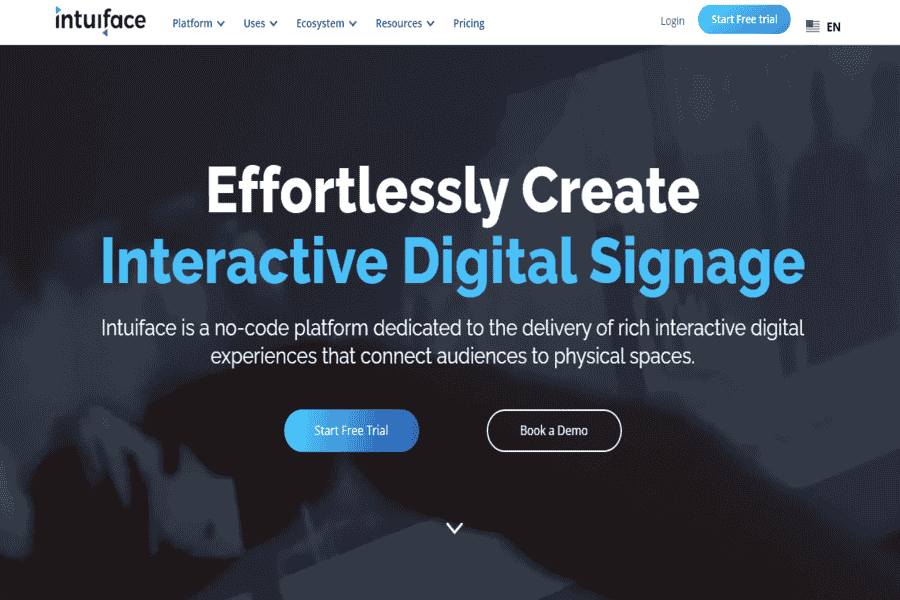
Intuiface is an interactive experience platform integrating AI to offer personalized content and real-time recommendations. It’s widely used for digital signage, kiosk systems, and e-commerce websites.
Starts at $49/month for basic plans—custom pricing for enterprise solutions.
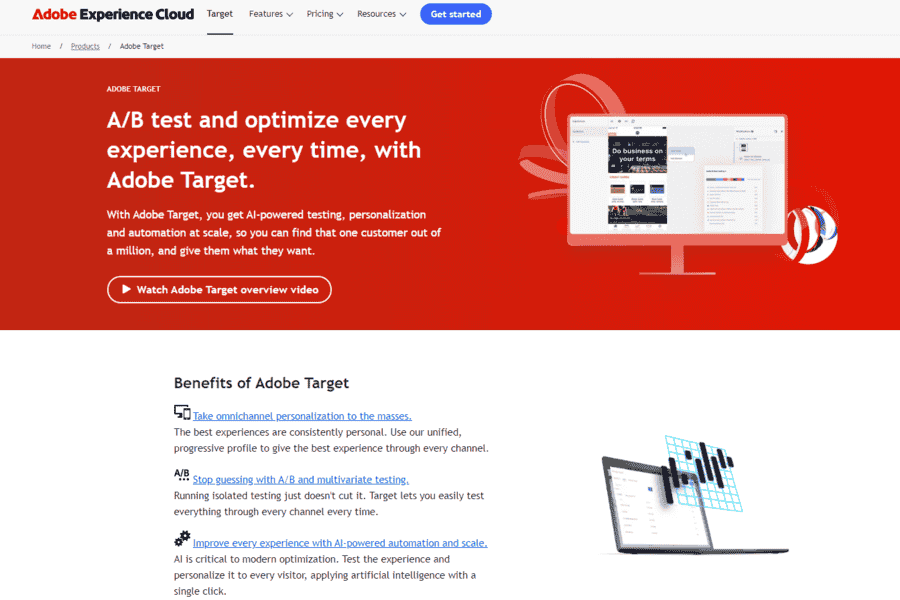
Adobe Target is an enterprise-level personalization solution that leverages AI to deliver tailored experiences, including personalized product recommendations for e-commerce sites and media platforms.
Custom pricing based on business needs.
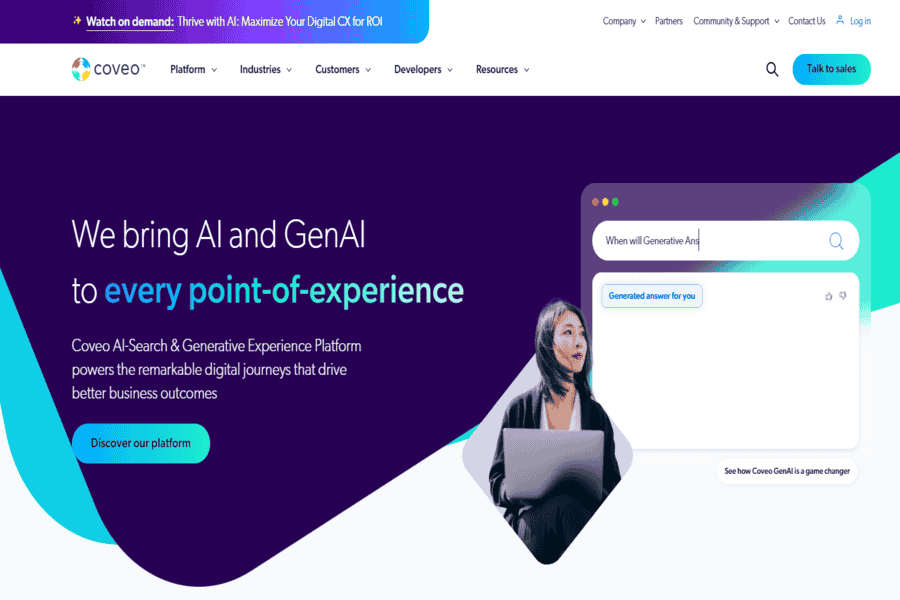
Coveo uses AI to personalize experiences by offering product recommendations and content suggestions for e-commerce sites, knowledge management systems, and customer support platforms.
Custom pricing based on business size and needs.
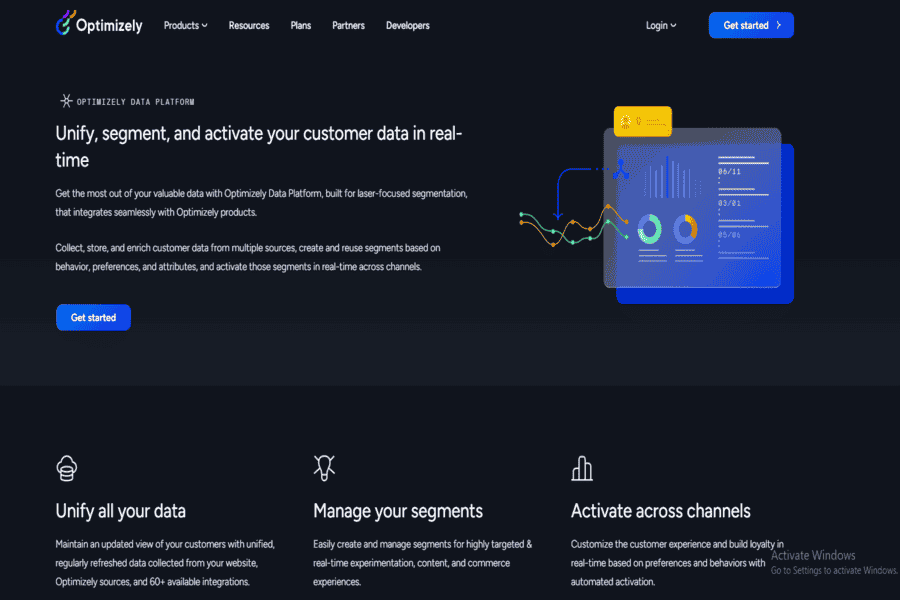
Zaius is a customer data platform (CDP) that combines AI with customer behavior data to personalize product recommendations, marketing campaigns, and communication strategies for e-commerce businesses.
Custom pricing based on the scale of business.
AI-powered recommendation engines have revolutionized the e-commerce landscape:
By analyzing browsing and purchase history, AI can suggest relevant products, increasing the likelihood of conversions.
AI can dynamically tailor offers to individual customers, optimizing marketing campaigns and boosting sales.
AI can help customers discover new products they might not have considered, expanding their choices and driving innovation.
AI-powered recommendation engines have transformed the media industry:
AI can curate personalized playlists, movie recommendations, and news feeds, keeping users engaged and satisfied.
AI can help users discover new content, artists, or genres, broadening their horizons and fostering a sense of community.
AI can optimize ad targeting, ensuring ads are shown to the right audience at the right time and improving campaign effectiveness.
While AI-powered recommendation engines have the potential to revolutionize industries, they also present several challenges that must be addressed:
Recommendation systems often rely on vast user data, including personal information, browsing history, and purchase behavior.
Protecting this sensitive data from cyberattacks and breaches is crucial to maintaining user trust.
Adhering to strict data privacy regulations like GDPR and CCPA is essential to avoid legal and reputational risks.
When a new user interacts with a system, limited data is available to make accurate recommendations.
can lead to suboptimal recommendations and a poor user experience.
Hybrid approaches that combine collaborative filtering with content-based filtering can address this. Additionally, leveraging external data sources or using demographic information can help.
If the training data used to develop the recommendation system is biased, the system’s recommendations will also be biased.
This can lead to unfair or discriminatory recommendations, particularly for marginalized groups.
To mitigate bias, it is essential to use diverse and representative datasets. Additionally, regular audits and testing can help identify and address biases in the system.
Users should know how recommendation systems work and how their data is used.
Recommendation systems should be designed to be fair and unbiased, avoiding discriminatory practices.
Developers and organizations should be held accountable for the ethical implications of their recommendation systems.
The future of AI-powered recommendation engines is filled with exciting possibilities. Here are some key trends that are shaping the landscape:
AI will leverage real-time data, such as location, weather, and time of day, to deliver hyper-personalized recommendations.
Businesses can offer tailored promotions and discounts based on a customer’s current situation, such as a nearby store or event.
Contextual recommendations can significantly improve the user experience by providing relevant and timely suggestions.
AI can analyze social interactions like likes, shares, and comments to understand user preferences and social trends.
By incorporating social signals, AI can recommend content or popular products among a user’s social circle.
Social influence can increase user engagement and a stronger sense of community.
AI algorithms will be developed with fairness and bias mitigation to avoid discriminatory recommendations.
AI systems will be designed to be transparent and explainable, allowing users to understand the rationale behind recommendations.
Protecting user privacy and data security will be a top priority as AI-powered recommendation systems become more sophisticated.
AI systems can explain their reasoning behind recommendations, increasing user trust and transparency.
AI can process and analyze multiple data types, such as text, images, and video, to provide more accurate and relevant recommendations.
AI algorithms will continuously learn from user feedback and interactions to improve their recommendations.
AI-powered advice engines have become vital tools for organizations across diverse industries. These systems can use AI’s power to supply personalized reports that pressure purchaser satisfaction, loyalty, and sales. As AI continues to evolve, we can assume even extra modern and impactful applications of recommendation engines in the years yet to come.
